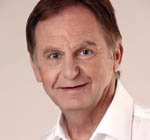
Howard Sattler is 6PR’s “shock jock” who does the 3pm-6pm drive shift weekdays, and can get depressed at times. In fact, depression has been the subject of his talk-back show and he clearly believes in de-stigmatising mental illness. He has disclosed his use of antidepressants, particularly when going through divorce, and he admits he once contemplated suicide after failing an exam. “The reason I talk about it publicly is that I want people to understand that I am not ashamed of it, nor should they be, and that they are not alone,” he said.
“The most important thing you hear with all these tragic stories is that people try to battle it alone, they don’t want to talk to friends, relatives, or business colleagues and they think people will not want to know them or will say they are off the planet.”
“Well, there but for the grace of God go lots of people, and it is just an illness just like any other illness. It should be talked about openly.”
Reflecting back, he said the media treated suicide and mental illness as a taboo subject not long ago. “We were counselled not to talk about it because we might encourage people to perform self-harming acts. Nobody bothered to think what led a person to such a thing and what they might have been going through and how it could have been prevented.”
Howard counts Jeff Kennett as a mate, probably because his work with Beyond Blue takes the opposite approach – encouraging on air discussion.
“I had a classic example where a couple of young teenagers jumped off an overpass into incoming traffic. I had to take a very risky path by discussing it in some detail and making sure I didn’t glorify it because all their friends had come along and thrown flowers onto the freeway. I went on air and said it wasn’t pretty at all and described how the act may have happened and what the impact was, not only for the two who killed themselves but for the mother and daughter in the car they jumped onto. Suddenly two bodies come through the windscreen. Just imagine what affect that had.”
Initial self-doubts over this approach passed when no-one phoned in to criticise him.
“It was awful, it was gory and it was traumatic for all the people involved. So that is what we do these days, we are telling it like is. There is nothing pleasant about being depressed and nothing pleasant about suicide.” He even suggests talking about it helps those scarred by the experience.
Mind you, Howard and others in the media are still sorting out whether they are pandering to extremes.
“The worst thing is when pop stars take their own lives or engage in strange acts that lead to their deaths. I think we have to be very pointed in not glorifying that and saying that they went out at the top – thinking of Kurt Kobain and people like that.”
What about his attitude to assisted suicide?
“For some reason politicians don’t think that suicide is a vote catcher. I am entirely pro-voluntary euthanasia. People own their bodies and if they have reached the point where there is little or no quality of life they should be able to make the decision to end it….a decision made entirely in line with their living will.” He said lawyers, doctors, community workers and the family should be distanced from the decision.
When it comes to the role of the medical profession, Howard, as you would expect, is not short of an opinion.
“The medical industry should be encouraging people to talk, not just to them. Charmaine Dragun’s parents didn’t know the extent of the problem, nor did her partner. The doctors have to include these people because they are part of the logical support group. It is all very well to say patient confidentially but in this particular instance, and we are talking about mental illness, those closest to the person, who they nominate, should be brought in. They might not want to bother people, but for goodness’ sake, therein lies the problem – a lot of people end up alone on a cliff top like poor old Charmaine.”
“I think patient confidentiality is a smoke screen that a lot of doctors hide behind, and there are situations where people cannot deal with it without a support group and people close to them. These people become carers of a kind.”
“You might well be still operating and doing your job but apart from that, in your private moments, you may be agonising. So how can you not include the carers? I reckon more often than not, you hear from people left behind that they just didn’t know, they didn’t realise the problem was as bad as it was.”
Howard wants changes to laws. He thinks the majority have suffered a “mental condition” at some time and around half of the population have been through some sort of mental illness. No wonder then that it crops up on talkback radio.

